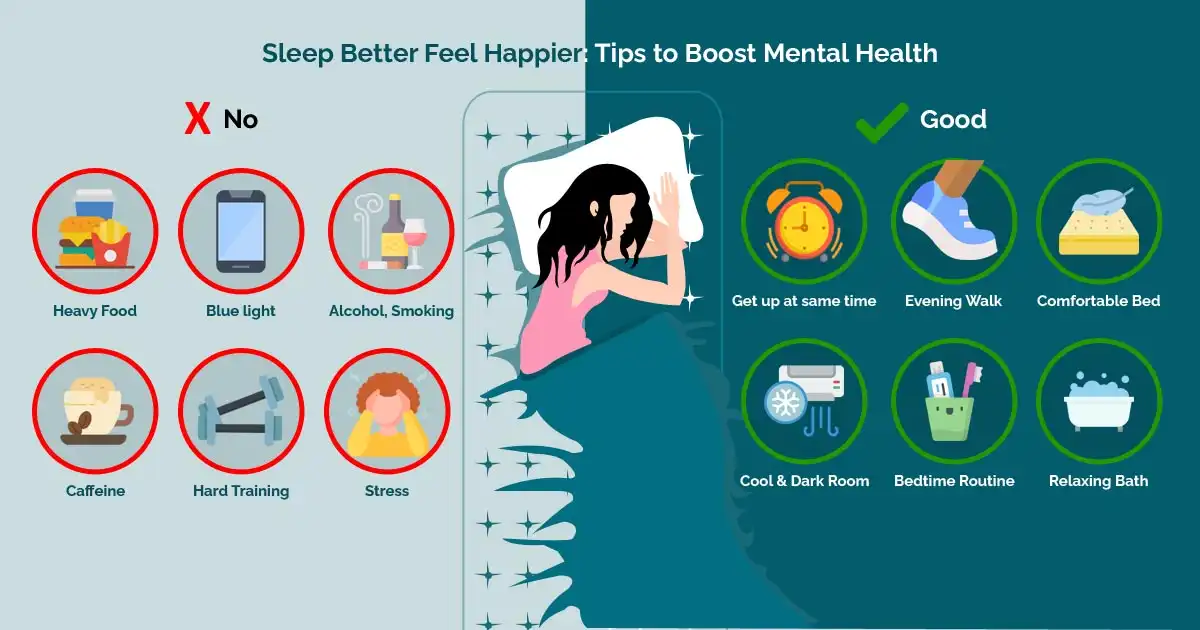Sleep Better Feel Happier: Tips to Boost Your Mental Health!

Getting a good night’s sleep is essential for our complete well-being, especially regarding our mental health. According to the World Health Organization (WHO), mental well-being is a fundamental aspect of overall health. In essence, one cannot achieve true health without addressing and prioritizing mental health.
Lack of sleep negatively affects our mood, cognitive function, and overall quality of life. If you want to improve your sleep health and boost your mental well-being, this blog is for you.
This blog has compiled practical tips and strategies to improve your sleep routine and boost your mental health. From creating a relaxing bedtime routine to understanding the causes and effects of sleep deprivation, we have you covered.
Read on to discover the benefits of sleep, and learn how to prioritize your mental health through improved sleep.
Importance Of Quality Sleep
– Understanding Impact Of Sleep On Mental Health And Overall Well-Being
Sleep affects our mental health and overall well-being. During sleep, our bodies restore and rejuvenate, allowing the brain to consolidate memories, process emotions, and regulate mood.
When we consistently get quality sleep, cognitive function improves, energy levels increase, and emotional resilience is enhanced.
On the other hand, when we lack sufficient sleep, our mental health can suffer. Sleep disorder and depression & anxiety are interlinked.
Not only this, sleep deprivation worsens the existing mental health conditions. You may struggle to cope with daily stresses and challenges if left unnoticed.
By understanding the importance of quality sleep, we can prioritize our mental health. In the next section, we will delve deeper into the impact of sleep on our mental well-being and explore effective tips to ensure we get the restorative sleep our minds and bodies need. Stay tuned!
Top 4 Tips to Optimize Your Sleep Health!
– Creating a Restorative Sleep Environment
This section gives tips for creating a sleep-friendly environment and establishing healthy bedtime routines.
Creating a sleep-friendly environment improves our sleep quality and overall mental health. Here are a few suggestions to help you learn how to sleep better.
- Tip 1: Set the mood
Make your bedroom a peaceful and comfortable space. Keep the room cool, dark, and quiet. Consider using blackout curtains, earplugs, or a white noise machine to keep your mind off of any distracting sounds.
- Tip 2: Banish screens
Avoid electronic devices, including smartphones, tablets, and laptops, before sleep. The blue light from these devices can disrupt your sleep patterns and negatively impact your mental health. Instead, indulge in relaxing activities like reading a book or practicing meditation.
- Tip 3: Establish a bedtime routine
A consistent sleep routine can signal your body that it’s time to wind down and prepare for sleep. Consider incorporating calming activities before bed, such as taking a warm bath, practicing deep breathing exercises, or listening to soothing music.
- Tip 4: Limit caffeine and alcohol intake
Consuming caffeine or alcohol close to bedtime can interfere with sleep. Watch your caffeine intake during the day. Avoid alcohol consumption at least a few hours before bed.
Our next section will explore additional strategies to establish healthy bedtime routines that can further optimize your sleep and enhance your mental well-being.
The Power of a Bedtime Routine
Explore the benefits of winding down before sleep and outline practical activities to incorporate into a nightly routine.
Having a consistent bedtime routine helps signal your body that it’s time to wind down and prepare for sleep and has numerous benefits for your mental health. A well-established routine can reduce anxiety, lower stress levels, and promote overall relaxation, allowing you to fall asleep quickly.
What Should You Include in Your Bedtime Routine?
Here are a few effective activities to consider.
- Reading: Engaging in a quiet and calming activity like reading a book can help shift your focus away from the day’s stresses and relax your mind.
- Deep breathing exercises: Deep breathing exercises or mindfulness techniques can help calm your nervous system and promote relaxation.
- Gentle stretching or yoga: Incorporating gentle stretching or a short yoga session into your routine helps relax your body by releasing tension.
- Journaling: Taking a moment to jot down your thoughts and reflect on the day can help clear your mind and alleviate any worries or anxieties that might keep you awake.
Remember, the key is finding activities that work for you and bringing peace and tranquillity. Experiment with different activities and note how they make you feel before settling on a bedtime routine that suits your needs.
In our next section, we will explore the importance of maintaining a consistent sleep routine and strategies to help you achieve it. Take advantage of the opportunity to improve your sleep and enhance your mental well-being.
Create a Sleep-Friendly Environment!
Creating a sleep-friendly environment is crucial for optimizing the quality of your sleep and to boost your mental health. It’s essential to ensure your bedroom is a peaceful and relaxing space, free from distractions that can interfere with your sleep.
Start by making sure your bed and pillows are comfortable and supportive. Buy a good quality mattress and pillows that suit your needs. To black out any unwanted light, use eye mask or blackout curtains.
Pay attention to the temperature of your room. Keep it cool, as a more relaxed environment can promote better sleep. Use fans or air conditioning to regulate the temperature if necessary.
Additionally, reduce noise by using earplugs or a white noise machine. These tools can help drown out disturbing sounds disrupting your sleep.
Creating a sleep-friendly environment sets the stage for a restful night’s sleep. Stay tuned for our next section, exploring practical techniques to help you establish a consistent sleep schedule. Good sleep and improved mental well-being await you!
Cultivate a Healthy Mindset
Cultivating a healthy mindset is mandatory to achieve quality sleep and boost mental health. The connection between our thoughts and feelings before bed and the quality of our sleep is often underestimated. However, with a few simple strategies, you can foster a positive mental state that promotes deep, restorative sleep.
One effective practice is to engage in relaxation techniques before bedtime. Consider incorporating meditation, deep breathing exercises, or gentle stretching into your nightly routine. These practices can help calm your mind and prepare it for restful sleep.
Another helpful strategy is to practice gratitude before bed. Sit, reflect, and realize all the good things that happened during the day and be thankful for that. This simple act can shift your mindset from a place of stress or worry to a more positive and relaxed state, making it easier to drift into a peaceful sleep.
Furthermore, it’s essential to establish boundaries and set aside time for self-care throughout the day. Do things that make you feel happy. Happiness and joy can positively impact your mental well-being, leading to better sleep at night.
By cultivating a healthy mindset, you sleep better and feel happier. A better quality of sleep entails improved mental well-being. In the next section, we will explore the importance of maintaining a consistent sleep schedule and offer tips for establishing a healthy sleep routine.
What is Consistency in Sleep Health?
Maintaining consistent sleep and wake-up time is one of the most vital factors in achieving better sleep and fostering good mental health. Our bodies and minds thrive on routine, and in terms of sleep, consistency is key.
By going to bed and waking up at the same time daily, you can regulate your biological clock – the circadian rhythm. This natural rhythm helps establish balance and harmony within your body, promoting healthy sleep patterns.
When you consistently adhere to a sleep schedule, you train your body to recognize when to wind down and prepare for sleep. This can significantly reduce the difficulty of falling asleep.
Moreover, maintaining a regular sleep schedule can help regulate your mood and emotions by enhancing your mental well-being. When your body gets accustomed to a consistent sleep routine, it can better manage stress and anxiety, improving mental health.
A healthy sleep routine is essential. Set a consistent bedtime and waking time, even on weekends. Avoid the temptation to sleep in or stay up late, as this can disrupt your body’s natural rhythm and make it harder to adjust during the workweek.
In addition, creating a relaxing bedtime routine sends messages to your body that it’s time to wind down. Dimming the lights, avoiding stimulating activities, and putting aside electronic devices at least sixty minutes before bed prepare your brain for sleep.
You are taking a proactive step towards better mental health by prioritizing consistency in your sleep schedule. In the following section, we will explore the impact of a sleep-friendly environment and offer tips for optimizing your sleep space. Stay tuned!
When to Seek Professional Help?
Seeking professional help when needed is crucial in improving your sleep and overall mental health. While self-care activities can be helpful, it’s essential to recognize that sometimes additional support is necessary. If you’ve tried various sleep tips and still struggle, it may be time to seek help from a healthcare professional or therapist.
A professional can help diagnose the exact problem or any underlying issues affecting your sleep, such as anxiety or depression, and develop a personalized treatment plan. They can also guide sleep hygiene, relaxation techniques, and other evidence-based strategies to promote better sleep.
Remember, there is no shame in asking for help. Taking the initiative to seek professional support demonstrates strength and a commitment to taking care of your mental well-being. You deserve to sleep and feel better, so don’t hesitate to seek the assistance you need.
In conclusion, prioritizing sleep is vital to maintaining good mental health. By adopting the practical tips we have discussed, you are taking a positive step toward improving your sleep quality and overall well-being. Remember, sleep is no longer a luxury but a necessity for your mental health.
While self-care activities are beneficial, it is essential to recognize when additional support is needed. Seeking professional help, if necessary, shows strength and a commitment to your mental well-being. Feel free to ask for guidance if you’ve tried everything and are still struggling. You deserve a good night’s sleep and to feel your best.
So, let’s begin implementing these tips into our daily routines. Start with small changes and be patient with yourself. Better sleep awaits you, and with it, improves mental health.
Disclaimer:
The information above is for general informational purposes only. Under no circumstances are they to be considered a substitute for professional advice. We do not intend to treat, diagnose, or cure any sleep or mental health conditions through this information. It is best to consult a qualified healthcare professional before implementing any suggestions or changing your sleep or mental health regimen. The content on this blog is based on general knowledge and may only be suitable for some. Individual circumstances vary, and a healthcare professional can provide personalized guidance based on your needs.
References
- Scott, Alexander J., Thomas L. Webb, Marrissa Martyn-St James, Georgina Rowse, and Scott Weich. “Improving sleep quality leads to better mental health: A meta-analysis of randomised controlled trials.” Sleep medicine reviews60 (2021): 101556.
Link: https://www.sciencedirect.com/science/article/pii/S1087079221001416 - Zhang, Jihui, Diana Paksarian, Femke Lamers, Ian B. Hickie, Jianping He, and Kathleen Ries Merikangas. “Sleep patterns and mental health correlates in US adolescents.” The Journal of Pediatrics182 (2017): 137-143.
Link: https://www.sciencedirect.com/science/article/abs/pii/S0022347616312355 - Charest, Jonathan, and Michael A. Grandner. “Sleep and athletic performance: impacts on physical performance, mental performance, injury risk and recovery, and mental health: an update.” Sleep medicine clinics17, no. 2 (2022): 263-282.
Link: https://www.sciencedirect.com/science/article/am/pii/S1556407X2200025X - https://www.columbiapsychiatry.org/news/how-sleep-deprivation-affects-your-mental-health
- https://www.mentalhealth.org.uk/explore-mental-health/publications/how-sleep-better







